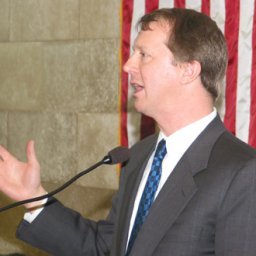Legislation Would Provide Funding Sources for Municipalities and Counties to Update and Replace Antiquated Sewer Systems
TRENTON – Two bills sponsored by Senator Bob Smith that would take steps to reduce pollution caused by rainwater runoff and sewer overflow were approved today by the Senate Environment and Energy Committee.
“Many municipalities throughout the state have outdated and antiquated sewer and water management systems that cause pollution to run into waterways,” said Senator Smith (D-Middlesex). “In order to protect New Jersey residents from the hazards caused by pollution – including health risks – we must assist counties, municipalities and utility authorities in updating and replacing these systems. We can do this while encouraging these entities to use green infrastructure that will have a positive impact on the environment.”
The first bill (S-1555) would aid municipalities with the repair and replacement of outdated sewer pipes that carry both stormwater and sewage to treatment plants. When it rains, these combined pipes fill quickly and treatment plants often reach capacity of water intake. The pipes are designed to allow for sewage to overflow into waterways to avoid backups in homes and basements.
The bill would require entities to identify measures to abate and prevent combined sewer overflow and submit a plan to the state Department of Environmental Protection. It would create a “Combined Sewer Overflow Solutions Fund,” which would provide grants to these entities to improve their sewer systems. This grant program would give priority to those entities that use or plan to use green infrastructure in updating their sewer systems. The bill would also provide an exemption to the two percent property tax cap for capital expenditures and debt services of combined sewer overflow abatement and prevention measures.
“Sewage overflow can have hugely detrimental effects on the health of the citizens of communities using a combined sewer system as well as the environment and ecology near the waterways that the sewage dumps into,” said Senator Smith. “Repairing and replacing these systems is expensive and, with municipalities’ current economic struggles, often unfeasible. This legislation would provide for a funding source so that new, environmentally-friendly systems can be installed.”
The second bill (S-1557) would authorize a county or municipality or a county-wide or municipal utilities authority that holds a combined sewer system permit to create a stormwater utility to manage stormwater runoff. A stormwater utility is similar to an electric or water utility and would ensure a dedicated funding source to help tackle issues such as combined sewer overflow or rainwater runoff which causes pollutants to flow into waterways. The bill would authorize these entities to finance the creation, operation and maintenance of the stormwater utility systems through the imposition of user fees.
“Stormwater runoff can cause sewage, oils, fertilizers and other wastes to run into lakes and rivers, and along with combined sewer overflow, it is causing New Jersey’s waterways to become increasingly polluted,” added Senator Smith. “The creation of a stormwater utility would establish a dedicated funding source to help tackle these and other stormwater management issues that municipalities and counties are facing.”
Early this month, the Senate Environment and Energy Committee unanimously released legislation (S-831) sponsored by Senator Smith along with Senator Nicolas P. Scutari (D-Union/Middlesex/Somerset) that would require notification by a public service announcement on television or radio and in newspapers of a sewer overflow.
Additionally, the “Adopt a Barnegat Bay Stormwater Management Basin Act” (S-1084) sponsored by Senator Paul A. Sarlo (D-Bergen/Passaic) and Senator Smith was approved by the full Senate in early February. This bill would allow businesses and nonprofit organizations to adopt, maintain, fund and operate a stormwater basin both within the Barnegat Bay watershed and throughout the state. It is now in the Assembly awaiting further consideration.
S-1555 was approved by the Senate Environment and Energy Committee with a vote of 4-0. S-1557 was approved by the Committee with a vote of 3-1. Both bills now head to the Senate Budget and Appropriations Committee for further review.


